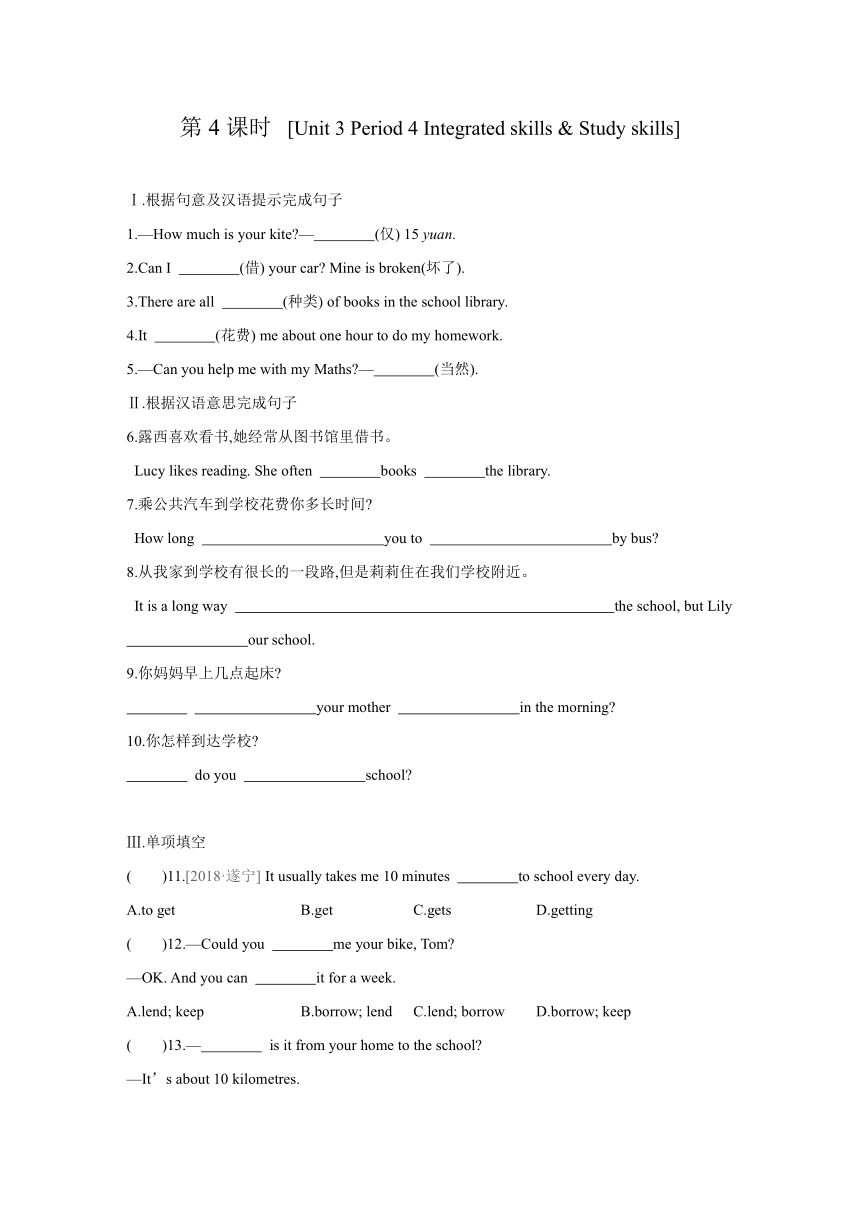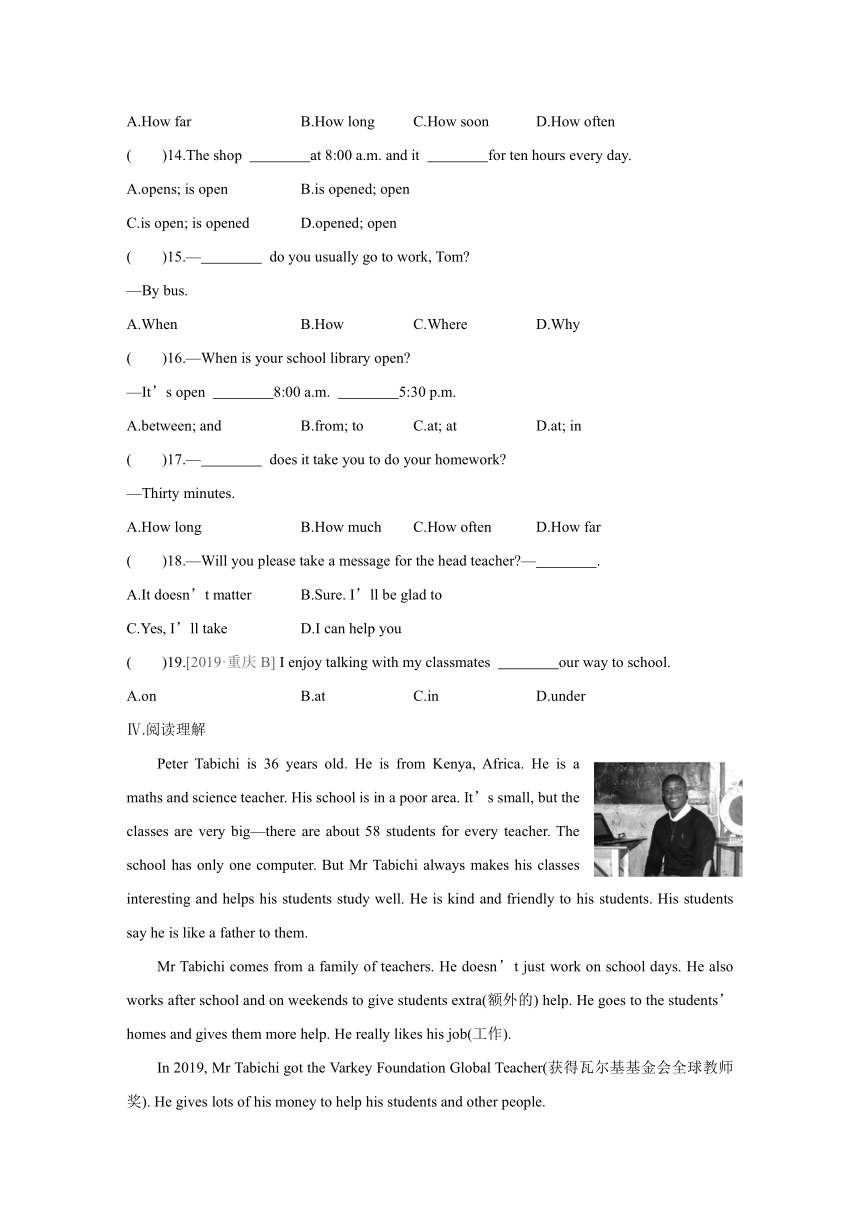译林牛津版英语七年级上册同步课时练习:Unit 3 Period 4 Integrated skills & Study skills(含答案)
文档属性
| 名称 | 译林牛津版英语七年级上册同步课时练习:Unit 3 Period 4 Integrated skills & Study skills(含答案) |  | |
| 格式 | docx | ||
| 文件大小 | 58.0KB | ||
| 资源类型 | 教案 | ||
| 版本资源 | 牛津译林版 | ||
| 科目 | 英语 | ||
| 更新时间 | 2022-05-15 08:58:03 | ||
图片预览


文档简介
第4课时 [Unit 3 Period 4 Integrated skills & Study skills]
Ⅰ.根据句意及汉语提示完成句子
1.—How much is your kite — (仅) 15 yuan.
2.Can I (借) your car Mine is broken(坏了).
3.There are all (种类) of books in the school library.
4.It (花费) me about one hour to do my homework.
5.—Can you help me with my Maths — (当然).
Ⅱ.根据汉语意思完成句子
6.露西喜欢看书,她经常从图书馆里借书。
Lucy likes reading. She often books the library.
7.乘公共汽车到学校花费你多长时间
How long you to by bus
8.从我家到学校有很长的一段路,但是莉莉住在我们学校附近。
It is a long way the school, but Lily
our school.
9.你妈妈早上几点起床
your mother in the morning
10.你怎样到达学校
do you school
Ⅲ.单项填空
( )11.[2018·遂宁] It usually takes me 10 minutes to school every day.
A.to get B.get C.gets D.getting
( )12.—Could you me your bike, Tom
—OK. And you can it for a week.
A.lend; keep B.borrow; lend C.lend; borrow D.borrow; keep
( )13.— is it from your home to the school
—It’s about 10 kilometres.
A.How far B.How long C.How soon D.How often
( )14.The shop at 8:00 a.m. and it for ten hours every day.
A.opens; is open B.is opened; open
C.is open; is opened D.opened; open
( )15.— do you usually go to work, Tom
—By bus.
A.When B.How C.Where D.Why
( )16.—When is your school library open
—It’s open 8:00 a.m. 5:30 p.m.
A.between; and B.from; to C.at; at D.at; in
( )17.— does it take you to do your homework
—Thirty minutes.
A.How long B.How much C.How often D.How far
( )18.—Will you please take a message for the head teacher — .
A.It doesn’t matter B.Sure. I’ll be glad to
C.Yes, I’ll take D.I can help you
( )19.[2019·重庆B] I enjoy talking with my classmates our way to school.
A.on B.at C.in D.under
Ⅳ.阅读理解
Peter Tabichi is 36 years old. He is from Kenya, Africa. He is a maths and science teacher. His school is in a poor area. It’s small, but the classes are very big—there are about 58 students for every teacher. The school has only one computer. But Mr Tabichi always makes his classes interesting and helps his students study well. He is kind and friendly to his students. His students say he is like a father to them.
Mr Tabichi comes from a family of teachers. He doesn’t just work on school days. He also works after school and on weekends to give students extra(额外的) help. He goes to the students’ homes and gives them more help. He really likes his job(工作).
In 2019, Mr Tabichi got the Varkey Foundation Global Teacher(获得瓦尔基基金会全球教师奖). He gives lots of his money to help his students and other people.
( )20.What subjects does Peter teach
A.English and Maths. B.Maths and History.
C.Geography and Science. D.Science and Maths.
( )21.Peter’s school has only one .
A.library B.small classroom
C.teacher D.computer
( )22. What are Peter’s father’s and mother’s jobs
A.Workers. B.Teachers. C.Farmers. D.Doctors.
( )23.What does Peter do on Sunday
A.He works at home.
B.He goes to his students’ homes.
C.He plays computer games.
D.He watches TV at home.
( )24.What does the second paragraph(段落) mainly want to tell us
A.Peter’s students like him very much.
B.Peter’s parents are both teachers.
C.Peter likes working after school.
D.Peter likes being a teacher.
Ⅴ.任务型阅读
I am Lisa.I study in Beijing International School now.There are fifty-four students in my class.Only six students go to school on foot, because they live near our school.Li Xiang says it usually takes him about fifteen minutes to walk to school.Eighteen students go to school by bike.Some of them think it is faster to ride bikes than to take buses in the morning and evening.They also think riding bikes is good for their health.Twenty-two students take buses or the subway(地铁) to school.Most of them have to take more than one bus to get to school, so they must get up early every day.The other students go to school by car.Their parents drive them to school first, and then go to work.Do you know how I get to school I’m one of the eighteen people.
根据短文内容,回答下列问题。
25.How long does it take Li Xiang to walk to school
26.How many students go to school by car
27.How do you go to school Why
答案
Ⅰ.1.Only 2.borrow 3.kinds 4.takes 5.Sure
Ⅱ.6.borrows; from
7.does it take; get to school
8.from my home to; lives near
9.What time does; get up
10.How; get to
Ⅲ.11.A
12.A 延续性动词与非延续性动词。lend 意为“借(出)”,为非延续性动词;borrow意为“借(入)”,为非延续性动词;keep 意为“借”,为延续性动词,可与“for+一段时间”连用。
13.A 疑问短语辨析。how far意为“多远”,询问距离;how long意为“多长”,询问时间的长短或物体的长度;how soon意为“多久以后”,对“in+一段时间”提问;how often意为“多久一次”,询问频率。句意:“从你家到学校有多远 ”“大约10千米。”故选A。
14.A 15.B 16.B 17.A 18.B
19.A
Ⅳ.20.D 细节理解题。由文章第一段第三句“He is a maths and science teacher.”可知,Peter教数学和科学。
21.D 细节理解题。由文章第一段倒数第四句“The school has only one computer.”可知,Peter的学校里仅有一台电脑。
22.B 推理判断题。由第二段的第一句“Mr Tabichi comes from a family of teachers.”可知,Peter来自教师之家,由此可推断,他的父母都是教师。
23.B 细节理解题。由第二段的第三、四句“He also works after school and on weekends to give students extra(额外的) help. He goes to the students’ homes and gives them more help.”可知,Peter周六和周日去他的学生家给予帮助。故选B。
24.D 主旨大意题。由第二段的最后一句“He really likes his job(工作).”可知,Peter喜欢老师这份工作。其余三个选项是本段某方面的信息,不能概括段落的主旨,故选D。
Ⅴ.25.About fifteen minutes. 26.Eight.
27.I go to school on foot because I live near my school. /I go to school by bike because I live far from my school./…(答案不唯一,合理即可)
Ⅰ.根据句意及汉语提示完成句子
1.—How much is your kite — (仅) 15 yuan.
2.Can I (借) your car Mine is broken(坏了).
3.There are all (种类) of books in the school library.
4.It (花费) me about one hour to do my homework.
5.—Can you help me with my Maths — (当然).
Ⅱ.根据汉语意思完成句子
6.露西喜欢看书,她经常从图书馆里借书。
Lucy likes reading. She often books the library.
7.乘公共汽车到学校花费你多长时间
How long you to by bus
8.从我家到学校有很长的一段路,但是莉莉住在我们学校附近。
It is a long way the school, but Lily
our school.
9.你妈妈早上几点起床
your mother in the morning
10.你怎样到达学校
do you school
Ⅲ.单项填空
( )11.[2018·遂宁] It usually takes me 10 minutes to school every day.
A.to get B.get C.gets D.getting
( )12.—Could you me your bike, Tom
—OK. And you can it for a week.
A.lend; keep B.borrow; lend C.lend; borrow D.borrow; keep
( )13.— is it from your home to the school
—It’s about 10 kilometres.
A.How far B.How long C.How soon D.How often
( )14.The shop at 8:00 a.m. and it for ten hours every day.
A.opens; is open B.is opened; open
C.is open; is opened D.opened; open
( )15.— do you usually go to work, Tom
—By bus.
A.When B.How C.Where D.Why
( )16.—When is your school library open
—It’s open 8:00 a.m. 5:30 p.m.
A.between; and B.from; to C.at; at D.at; in
( )17.— does it take you to do your homework
—Thirty minutes.
A.How long B.How much C.How often D.How far
( )18.—Will you please take a message for the head teacher — .
A.It doesn’t matter B.Sure. I’ll be glad to
C.Yes, I’ll take D.I can help you
( )19.[2019·重庆B] I enjoy talking with my classmates our way to school.
A.on B.at C.in D.under
Ⅳ.阅读理解
Peter Tabichi is 36 years old. He is from Kenya, Africa. He is a maths and science teacher. His school is in a poor area. It’s small, but the classes are very big—there are about 58 students for every teacher. The school has only one computer. But Mr Tabichi always makes his classes interesting and helps his students study well. He is kind and friendly to his students. His students say he is like a father to them.
Mr Tabichi comes from a family of teachers. He doesn’t just work on school days. He also works after school and on weekends to give students extra(额外的) help. He goes to the students’ homes and gives them more help. He really likes his job(工作).
In 2019, Mr Tabichi got the Varkey Foundation Global Teacher(获得瓦尔基基金会全球教师奖). He gives lots of his money to help his students and other people.
( )20.What subjects does Peter teach
A.English and Maths. B.Maths and History.
C.Geography and Science. D.Science and Maths.
( )21.Peter’s school has only one .
A.library B.small classroom
C.teacher D.computer
( )22. What are Peter’s father’s and mother’s jobs
A.Workers. B.Teachers. C.Farmers. D.Doctors.
( )23.What does Peter do on Sunday
A.He works at home.
B.He goes to his students’ homes.
C.He plays computer games.
D.He watches TV at home.
( )24.What does the second paragraph(段落) mainly want to tell us
A.Peter’s students like him very much.
B.Peter’s parents are both teachers.
C.Peter likes working after school.
D.Peter likes being a teacher.
Ⅴ.任务型阅读
I am Lisa.I study in Beijing International School now.There are fifty-four students in my class.Only six students go to school on foot, because they live near our school.Li Xiang says it usually takes him about fifteen minutes to walk to school.Eighteen students go to school by bike.Some of them think it is faster to ride bikes than to take buses in the morning and evening.They also think riding bikes is good for their health.Twenty-two students take buses or the subway(地铁) to school.Most of them have to take more than one bus to get to school, so they must get up early every day.The other students go to school by car.Their parents drive them to school first, and then go to work.Do you know how I get to school I’m one of the eighteen people.
根据短文内容,回答下列问题。
25.How long does it take Li Xiang to walk to school
26.How many students go to school by car
27.How do you go to school Why
答案
Ⅰ.1.Only 2.borrow 3.kinds 4.takes 5.Sure
Ⅱ.6.borrows; from
7.does it take; get to school
8.from my home to; lives near
9.What time does; get up
10.How; get to
Ⅲ.11.A
12.A 延续性动词与非延续性动词。lend 意为“借(出)”,为非延续性动词;borrow意为“借(入)”,为非延续性动词;keep 意为“借”,为延续性动词,可与“for+一段时间”连用。
13.A 疑问短语辨析。how far意为“多远”,询问距离;how long意为“多长”,询问时间的长短或物体的长度;how soon意为“多久以后”,对“in+一段时间”提问;how often意为“多久一次”,询问频率。句意:“从你家到学校有多远 ”“大约10千米。”故选A。
14.A 15.B 16.B 17.A 18.B
19.A
Ⅳ.20.D 细节理解题。由文章第一段第三句“He is a maths and science teacher.”可知,Peter教数学和科学。
21.D 细节理解题。由文章第一段倒数第四句“The school has only one computer.”可知,Peter的学校里仅有一台电脑。
22.B 推理判断题。由第二段的第一句“Mr Tabichi comes from a family of teachers.”可知,Peter来自教师之家,由此可推断,他的父母都是教师。
23.B 细节理解题。由第二段的第三、四句“He also works after school and on weekends to give students extra(额外的) help. He goes to the students’ homes and gives them more help.”可知,Peter周六和周日去他的学生家给予帮助。故选B。
24.D 主旨大意题。由第二段的最后一句“He really likes his job(工作).”可知,Peter喜欢老师这份工作。其余三个选项是本段某方面的信息,不能概括段落的主旨,故选D。
Ⅴ.25.About fifteen minutes. 26.Eight.
27.I go to school on foot because I live near my school. /I go to school by bike because I live far from my school./…(答案不唯一,合理即可)
同课章节目录
- 预备课程
- Lesson 1 Nice to meet you !
- Lesson 2 A happy family
- Lesson 3 A nice school
- Lesson 4 You look cool !
- Lesson 5 Wonderful things
- Lesson 6 Have nice food
- Lesson 7 Enjoy our days
- Lesson 8 Let's have fun !
- Unit 1 This is me
- Unit 2 Let's play sports
- Unit 3 Welcome to our school
- Unit 4 My day
- Unit 5 Let’s celebrate
- Unit 6 Food and lifestyle
- Unit 7 Shopping
- Unit 8 Fashion
